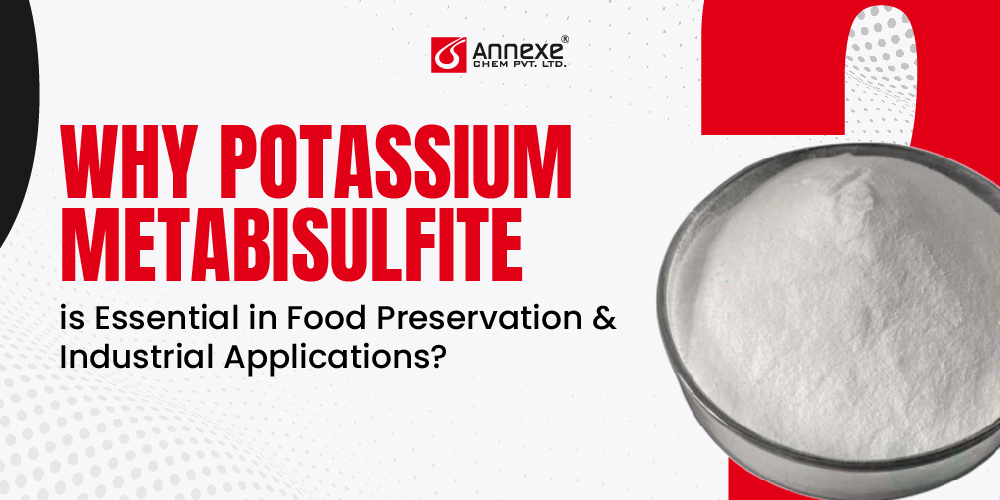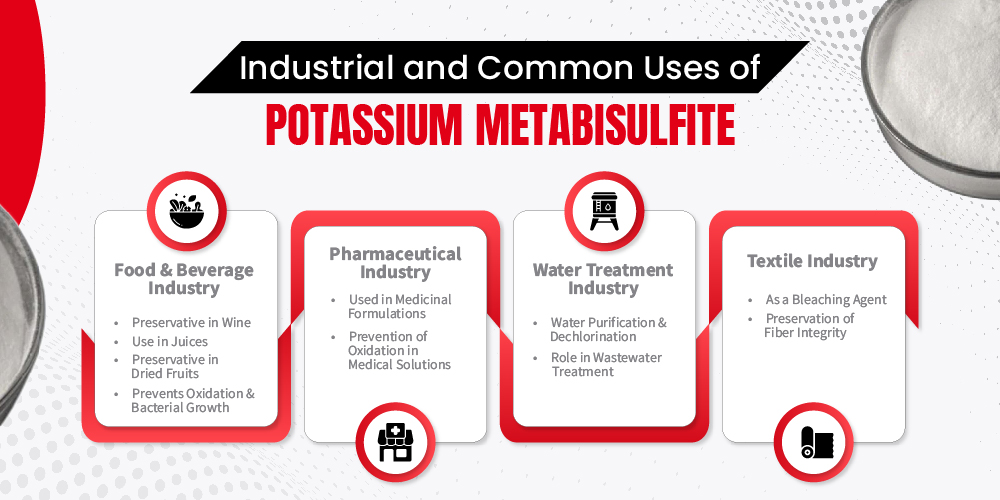Why Potassium Metabisulphite is Essential in Food Preservation and Industrial Applications? - Annexe Chem Pvt Ltd
Why Potassium Metabisulphite is Essential in Food Preservation and Industrial Applications?

- September 3, 2024
- By Akshita Patel
Imagine sipping your favorite glass of wine or enjoying a handful of dried fruits—ever wondered how they stay fresh and flavorful for so long? Behind the scenes, Potassium Metabisulphite plays a key role. This unassuming chemical compound is the secret ingredient used across industries, from food preservation to water treatment, ensuring that what we consume is safe, tasty, and long-lasting.
But what exactly is Potassium Metabisulphite, and how does it impact the products we rely on daily? Let’s dive into the world of this versatile and essential compound.
What is Potassium Metabisulphite?
Potassium Metabisulphite, often referred to as KMS, is a white crystalline powder with a strong sulfur odor. Chemically represented by the formula K2S2O5, it is an inorganic compound widely used for its preservative and antioxidant properties. When dissolved in water, it releases sulfur dioxide (SO2), a potent antimicrobial agent that helps inhibit the growth of bacteria and fungi.
Potassium Metabisulphite is composed of two potassium ions (K⁺) and one disulfite ion (S2O5²⁻). Its molecular weight is approximately 222.33 g/mol. In the presence of moisture or water, it releases sulfur dioxide, which reacts with oxygen, making it a powerful antioxidant and preservative.
What is Potassium Metabisulphite?
Potassium Metabisulphite, often referred to as KMS, is a white crystalline powder with a strong sulfur odor. Chemically represented by the formula K2S2O5, it is an inorganic compound widely used for its preservative and antioxidant properties. When dissolved in water, it releases sulfur dioxide (SO2), a potent antimicrobial agent that helps inhibit the growth of bacteria and fungi.
Potassium Metabisulphite is composed of two potassium ions (K⁺) and one disulfite ion (S2O5²⁻). Its molecular weight is approximately 222.33 g/mol. In the presence of moisture or water, it releases sulfur dioxide, which reacts with oxygen, making it a powerful antioxidant and preservative.
Physical Characteristics Of Potassium Metabisulphite
- Appearance: White crystalline powder or granules
- Odor: Strong sulfur smell
- Solubility: Highly soluble in water, where it forms acidic solutions. It is less soluble in alcohol and other organic solvents.
- Density: Approximately 2.34 g/cm³
- Melting Point: Decomposes at temperatures above 150°C
History and Discovery Of Potassium Metabisulphite
Potassium Metabisulphite has been used for centuries, especially in food preservation and winemaking. Its preservative properties have been known since ancient times when sulfur-based compounds were used to prevent the spoilage of food and beverages. It was formally synthesized and identified in the 19th century as the wine industry sought methods to preserve flavor and prevent spoilage. Today, it remains a widely used chemical in industries ranging from food to water treatment.

Industrial and Common Uses of Potassium Metabisulphite
Potassium Metabisulphite plays a vital role in various industries due to its preservative, antioxidant, and antimicrobial properties. Its wide-ranging applications make it an essential ingredient in everything from food preservation to pharmaceuticals, water treatment, and textiles. Below, we explore in detail how this versatile compound is applied across multiple industries.
1. Food and Beverage Industry
The food and beverage industry relies heavily on Potassium Metabisulphite to maintain product quality, flavor, and safety. As a preservative and antioxidant, it helps extend the shelf life of many consumables while protecting them from microbial contamination and oxidative damage.
- Preservative in Wine: Potassium Metabisulphite is a cornerstone of winemaking, where it serves multiple functions. During fermentation, it prevents the growth of unwanted bacteria and wild yeast, ensuring that only the selected yeast strains are active. Post-fermentation, it stabilizes the wine by preventing oxidation, which can alter the flavor, color, and aroma. This is particularly important for long-term aging, as the compound ensures the wine matures without spoilage. Additionally, it preserves the delicate balance of acidity and sweetness, making it essential for both red and white wines.
- Use in Juices: In fruit juices, particularly those prone to rapid spoilage, Potassium Metabisulphite prevents the growth of bacteria, molds, and yeasts. It protects the natural color and flavor of the juice by neutralizing oxygen that could cause oxidation. For instance, in citrus juices like orange or lemon, it ensures the juice remains fresh and vibrant in color, preventing the browning that results from oxidation.
- Preservative in Dried Fruits: When applied to dried fruits such as apricots, raisins, and apples, Potassium Metabisulphite extends their shelf life by preventing microbial contamination. It also preserves the bright color of fruits, which might otherwise darken during the drying process. This not only enhances the visual appeal of the product but also ensures that it retains its nutritional value for a longer period.
- Prevents Oxidation and Bacterial Growth: Potassium Metabisulphite’s ability to release sulfur dioxide (SO2) makes it highly effective in preventing oxidation—a process that can degrade the quality of foods and beverages. By inhibiting the chemical reactions caused by oxygen, it helps preserve freshness and flavor. Additionally, its antimicrobial properties prevent the growth of spoilage-causing bacteria, yeast, and molds, ensuring food safety and reducing waste.
2. Pharmaceutical Industry
Potassium Metabisulphite is also critical in the pharmaceutical industry, where its preservative and antioxidant capabilities contribute to the stability and effectiveness of medicines.
- Used in Medicinal Formulations: In injectable drugs and vaccines, Potassium Metabisulphite is often used to prevent oxidation of the active ingredients, which can compromise their effectiveness. For instance, medications containing active compounds that degrade when exposed to air benefit from the compound’s ability to neutralize oxygen and maintain the potency of the drug. Potassium Metabisulphite is also used in tablet formulations to protect sensitive ingredients from degradation during manufacturing and storage.
- Prevention of Oxidation in Medical Solutions: In liquid pharmaceutical solutions, oxidation can lead to changes in color, odor, and effectiveness. Potassium Metabisulphite serves as a stabilizing agent by preventing such reactions, thereby ensuring that medicines retain their intended therapeutic properties. This is especially crucial for certain ophthalmic solutions, intravenous fluids, and topical medications.
3. Water Treatment Industry
In the water treatment industry, Potassium Metabisulphite is valued for its role in purifying and treating water by neutralizing harmful chemicals and making water safe for consumption or discharge.
- Water Purification and Dechlorination: One of the primary uses of Potassium Metabisulphite in water treatment is as a dechlorinating agent. Chlorine is commonly used in water disinfection, but it can leave residual amounts that may be harmful if ingested or used in industrial processes. Potassium Metabisulphite reacts with chlorine and chloramine, neutralizing these residual chemicals and making the water safe for use in municipal systems, aquariums, and industrial boilers. Its application extends to industries such as food processing, pharmaceuticals, and agriculture, where pure, chlorine-free water is essential.
- Role in Wastewater Treatment: Potassium Metabisulphite is also used in the treatment of industrial wastewater. Many manufacturing processes discharge water containing pollutants and oxidizing agents that must be neutralized before release into the environment. This compound reduces the chemical oxygen demand (COD) by neutralizing excess oxidizing agents, ensuring that the wastewater complies with environmental safety standards. By doing so, it helps industries meet regulatory requirements and protect ecosystems from harmful discharge.
4. Textile Industry
The textile industry makes use of Potassium Metabisulphite primarily as a bleaching and reducing agent, especially during the preparation of fibers and fabrics for dyeing or finishing processes.
- As a Bleaching Agent: Potassium Metabisulphite is employed to bleach textiles by removing impurities and unwanted colors from natural fibers such as wool, cotton, and silk. It is particularly effective at reducing yellowing and discoloration, making the fabric more receptive to dye. This ensures that the final product has a uniform, vibrant color that meets the desired specifications. The use of this compound in textiles helps improve the quality of the finished product, whether it’s clothing, upholstery, or industrial textiles.
- Preservation of Fiber Integrity: Unlike harsher bleaching agents, Potassium Metabisulphite is gentler on fibers, ensuring that the fabric’s strength and softness are maintained throughout the bleaching process. This is especially important for delicate fabrics such as silk and wool, where preserving the quality of the material is paramount.
Potassium Metabisulphite’s wide-ranging applications across industries make it an indispensable chemical compound. Whether it’s preserving the flavor and safety of food and beverages, stabilizing life-saving medicines, ensuring clean water, or preparing textiles for production, this versatile compound is essential to modern industry. Its properties as a preservative, antioxidant, and bleaching agent enable it to meet the diverse needs of industries around the world, ensuring safety, quality, and efficiency at every turn.
Potassium Metabisulphite is a versatile compound with far-reaching benefits across various industries, from food preservation and water treatment to pharmaceuticals and textiles. Its ability to extend shelf life, prevent oxidation, and provide cost-effective solutions makes it a valuable asset for manufacturers worldwide.
At Annexe Chem Pvt. Ltd., we are proud to be India’s leading manufacturer of Potassium Metabisulphite, where innovation and excellence converge in pharmaceutical and food manufacturing. Our state-of-the-art FDA-GMP facility, complete with an in-house GLP-certified laboratory and cutting-edge R&D, ensures that every product we deliver meets the highest standards of quality and precision.
With a 3000 MT/year manufacturing capacity and a 30-ton HVAC system maintaining pristine production conditions, we provide an optimal environment for producing top-tier products. Trusted by over 400 industry leaders, Annexe Chem stands at the forefront of reliability and quality, helping revolutionize pharmaceutical and food production. We offer a premium selection of Pharma Excipients & APIs, coupled with advanced packaging techniques to ensure the integrity and safety of every product. Join Annexe Chem Pvt. Ltd. as we set new industry standards and continue our pursuit of excellence in every step of the manufacturing process.

Akshita Patel
As an advocate for sustainability, Akshita is committed to driving positive change within the chemical industry. She actively seeks out environmentally friendly solutions and promotes the adoption of sustainable practices. Akshita believes that a balance between economic growth and ecological responsibility is crucial for the industry's long-term success. She is dedicated to finding innovative ways to minimize environmental impact while maximizing efficiency and profitability.
Related Blogs

- March 23, 2023
- By Akshita Patel
Why Annexe Chem is The Best.
Founded in 2008, Annexe Chem Private Limited deals with manufacturing a wide range of Pharma APIs,.

- September 10, 2024
- By Akshita Patel
Magnesium Sulphate Dried: Everything You Need.
Chemical Composition and Structure Of Magnesium Sulphate Dried In the world of fine chemicals, Magnesium Sulphate.



